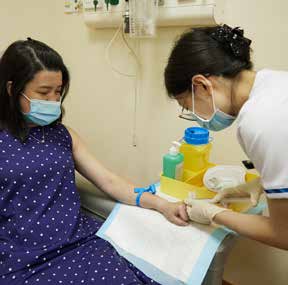More accurate risk-assessment tool ensures patients have fewer complications and appropriate post-op care, lower costs and better use of hospital resources
When a surgery is scheduled, tests and investigations are ordered to assess the patient’s fitness and risks in undergoing the procedure.
What medical conditions does the patient have? Will they affect his risks during the operation and how he recovers from it? Is the procedure major or minor? Is he likely to face complications and will he then need intensive care (ICU) post-surgery? Is an ICU bed available at the time?
To ensure accuracy and consistency in pre-surgery assessment of patients, Singapore General Hospital (SGH) began using an intelligent calculator known as CARES-ML (Combined Assessment of Risk Encountered in Surgery – Machine Learning) for all surgeries in June 2023. CARES-ML is an enhanced version of an earlier tool, CARES, developed in 2017 using artificial intelligence (AI) to collect and interpret data from 100,000 SGH patients.

All data from the patient’s pre-surgical assessments are added into the tool, which then calculates his risks and generates a report that includes a risk score. The higher the score, the greater the risk of a negative outcome with surgery.
“We have a 90 per cent certainty that the AI engine will be able to tell whether the patient needs ICU, a very important factor. Similarly, we have 83–86 per cent accuracy in predicting 30-day mortality (whether the patient will die within 30 days after surgery),” said
Associate Professor Hairil Rizal, Senior Consultant, Department of Anaesthesiology, SGH. “CARES-ML is a human-in-the-loop system, where humans are involved in both the training and testing stages of building an algorithm. It does not make the decision, but provides decision support. The final risk assessment is made by the clinician based on his professional judgment.”
As with most other AI engines, added Assoc Prof Hairil, the tool keeps on learning. “Over time, as new data come in, the tool becomes more and more accurate,” he said.
Every surgery carries some degree of risk. Of the more than 300 million major surgeries performed around the world annually pre-COVID-19, 17 per cent developed one or more complications. Knowing the risks lets the medical team consider ways of mitigating them or even to postpone the operation.
At SGH, patients scheduled for surgery are assessed by the anaesthetist and surgeon about 10 days before surgery. This allows the medical team to give the patient appropriate interventions if needed. Patients assessed as low-risk can typically proceed to surgery, while efforts are made to search for modifiable risk factors and optimise them for low-moderate, moderate-high and high-risk patients.
Patients with anaemia, for instance, have an increased risk of complications — including infection, stroke or kidney injury — but may not be aware of it. When anaemia is spotted early, patients can be treated for it. For patients in the higher risk categories, it may be necessary to consider less invasive surgical alternatives like keyhole, nonsurgical options, or to postpone the surgery if an ICU bed is unavailable.
Just before surgery, the patient is assessed again, with the latest health data — test results, feedback from patients and families — added into the calculator tool. Applying their own experience and expertise, doctors can then adjust the risk score up or down. “The beauty of AI is that it can trawl through large amounts of data within a few seconds. No human can do that,” said Assoc Prof Hairil.
Being able to accurately predict whether ICU will be required means better management of costly ICU resources. Patients who need ICU but were not assigned to one may experience suboptimal outcomes, while identifying those who do not need it frees up the resources for others. Following the risk calculation for 30-day mortality and ICU needs, the team is using the same engine to develop estimates for other complications, such as heart attack, respiratory complications and kidney failure.
While many predictive ML models developed worldwide have demonstrated excellent accuracy, conclusive studies are still lacking on how their deployment in real-world healthcare systems actually improves patient outcomes or the value of clinical care provided, said Assoc Prof Hairil.
SGH, thus, will be conducting a randomised control trial on the Impact of Machine Learning-based Clinician Decision Support Algorithms in Perioperative Care (IMAGINATIVE Trial) on 9,000 patients to assess the impact of CARESML deployment on healthcare outcomes such as complication rates, mortality and ICU utilisation. The study is funded by the National Medical Research Council, and its findings are expected to be ready by 2026.
